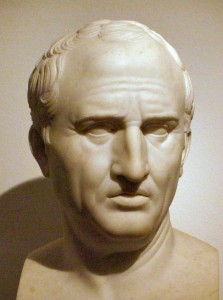 (Bust of Cicero – Source: Wikipedia)
(Bust of Cicero – Source: Wikipedia)
In a philosophical dialogue, the great Roman statesman and philosopher Cicero explains that a poor, yet morally good person will find much more happiness than a rich, morally bankrupt person. To illustrate his contention, he tells the story of Dionysius, a tyrant of the ancient Sicilian city of Syracuse.
In his climb to complete power, Dionysius had won much popular support through his various conquests throughout the region. However, to consolidate and secure his position, he committed many acts of atrocity. One violent removal of a disloyal person or enemy led to another which led to another and so forth. Eventually he came to see potential enemies everywhere and constantly surrounded himself guards of “uncouth savages” and took outrageous measures of precaution. As Cicero explained, “Dionysius’ determination to maintain his tyrannical rule virtually caused him to shut himself up in a prison.” The wealthiest and most powerful man in Sicily had ended up creating a self-imposed psychological – and indeed physical – prison. In fact, around his bedroom he dug a moat with a drawbridge which only he controlled.
Cicero summarily interpreted the bigger picture of the life of Dionysius and other such tyrants: “Dionysius was indicating clearly enough that happiness is out of the question if you are perpetually menaced by some terror. And as for himself, the possibility of returning to lawful courses and restoring to his fellow citizens their freedom and their rights was no longer open to him: because during the thoughtless days of his youth he had entangled himself in such terrible crimes and committed so many guilty acts that he could only return to sanity at the cost of his own destruction.” Indeed, despite his unending suspicion of and vigilance against traitors and assassins, he was after all, as we are told, poisoned by his doctors on the order of his son.
***
The lesson of Dionysius – from his brutal and ruthless climb to total power and his steady decay and decline into a paranoid and miserable existence – can inform our thinking about those contemporary dictators in the Middle East that are desperately clinging onto power. The Arab Spring, as I have written about before, is rattling, and in some places toppling, the positions of the authoritarian dictators of the Middle East. After decades of oppression, the people of these Arab and Persian countries are demanding that their leaders, who are lavishly and conspicuously wealthy with petroleum dollars, resign and step down from their thrones. The façade of obedience, inspired by the fear of the dictators’ brutal police forces, who are nominally judges, juries, and executioners, is a fragile one. And when the opportunity arises to challenge their arbitrary authority, the people will, to quote Thucydides, “eat them raw”.
These threatened feelings of insecurity, coupled with the paranoia inherent in the character of such regimes, create a tremendous incentive for the dictators to use every resource at their disposal to hold onto power. The moats dug around their oil-rich countries provide the illusion of comfort, however unhappy. Their answer to stronger and louder calls for them to step down is to dig deeper and wider, not abdicate peacefully.
If there is anything we can expect in the Middle East, it is that the future is gravely uncertain and that the dictators won’t give up their power without a long, hard fight.
Comments on this entry are closed.